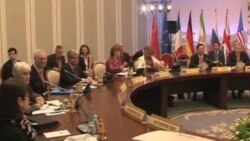Two days of intense negotiations over Iran’s nuclear program between Iran and the five permanent members of the UN Security Council – China, Britain, France, Russia and the U.S. – plus Germany, the group known as the P5+1, ended April 6th with little substantive progress.
European Union Foreign Policy Chief Catherine Ashton, who led the talks for the six world powers in Almaty, Kazakhstan said the two sides “remain far apart. . .We therefore agreed all sides will go back to their capitals to evaluate where we stand on the process.” Ms. Ashton added that she would be in touch with Iran’s top nuclear negotiator Saeed Jalili ”very soon in order to see how to go forward.”
Two days after the conclusion of the talks, on Iran’s annual National Nuclear Day, Iran announced that it has opened a new uranium-processing facility and two uranium mines.
Speaking of the nuclear negotiations in Kazakhstan, Secretary of State John Kerry said, “It’s fair to say that we were hoping that there would be a more fulsome presentation in Almaty that would have laid out with greater specificity and greater breadth what could have been done to reduce the tensions over Iran’s nuclear program.”
Mr. Kerry urged Iran to take the diplomatic process seriously, and he underscored President Barack Obama’s position in regard to Iran and nuclear arms:
[ACT :28 – DALET: POLICY/ACTUALITIES] “Iran cannot have and will not have a nuclear weapon. And the United States of America has made clear that we stand not just with Israel but with the entire international community in making it clear that we are serious, we are open to negotiation, but it is not an open-ended, endless negotiation; it cannot be used as an excuse for other efforts to try to break out with respect to a nuclear weapon.” [END ACT]
“President Obama doesn’t bluff,” said Secretary of State Kerry. “And we hope the Iranians will come back to the table with a very serious proposal.”
European Union Foreign Policy Chief Catherine Ashton, who led the talks for the six world powers in Almaty, Kazakhstan said the two sides “remain far apart. . .We therefore agreed all sides will go back to their capitals to evaluate where we stand on the process.” Ms. Ashton added that she would be in touch with Iran’s top nuclear negotiator Saeed Jalili ”very soon in order to see how to go forward.”
Two days after the conclusion of the talks, on Iran’s annual National Nuclear Day, Iran announced that it has opened a new uranium-processing facility and two uranium mines.
Speaking of the nuclear negotiations in Kazakhstan, Secretary of State John Kerry said, “It’s fair to say that we were hoping that there would be a more fulsome presentation in Almaty that would have laid out with greater specificity and greater breadth what could have been done to reduce the tensions over Iran’s nuclear program.”
Mr. Kerry urged Iran to take the diplomatic process seriously, and he underscored President Barack Obama’s position in regard to Iran and nuclear arms:
[ACT :28 – DALET: POLICY/ACTUALITIES] “Iran cannot have and will not have a nuclear weapon. And the United States of America has made clear that we stand not just with Israel but with the entire international community in making it clear that we are serious, we are open to negotiation, but it is not an open-ended, endless negotiation; it cannot be used as an excuse for other efforts to try to break out with respect to a nuclear weapon.” [END ACT]
“President Obama doesn’t bluff,” said Secretary of State Kerry. “And we hope the Iranians will come back to the table with a very serious proposal.”






